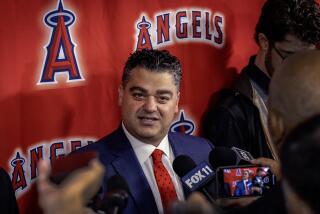Cash Isn’t a Magrane Headache
- Share via
In the time that passed between Joe Magrane’s last complete game and this one, the Angels fired Doug Rader, hired Buck Rodgers, fired Buck Rodgers, hired Marcel Lachemann, hired Dan O’Brien, fired Dan O’Brien, hired Whitey Herzog, retired Whitey Herzog, hired Bill Bavasi, changed uniforms, changed pitching coaches, changed just about everything, give or take their luck.
The key transaction there, of course, was hiring Whitey Herzog.
When he was released by the St. Louis Cardinals last August, Magrane was the right man at the right time--that is, a former Cardinal looking for work while Herzog, the former head Cardinal, was in charge of player contracts for the California Angels.
Come on down, Whitey said, so Magrane did.
Pitch a few games for us, Whitey suggested, so Magrane did that, too.
Soon, Magrane was Jed Clampett. He was out one day, throwin’ from a hill, and Whitey up and signed him for more than 13 mil.
Thirteen-point-three million, that is.
Dollar bills.
For four years.
Non-guaranteed.
At first, Magrane couldn’t believe his incredible good fortune. The search of Whitey’s gold--that wasn’t his intent. But what was Magrane supposed to do, run out the door with fistfuls of dollars being thrown at him?
Howls went up all over baseball. What in the world was Whitey thinking? Opening the vault for a just-released pitcher who had missed all of the 1991 season after undergoing a radical reconstruction of his left elbow? What if the elbow blows out again?
The howlers were doing a lot of self-satisfied nodding in early February when the Angels announced Magrane would need arthroscopic surgery on that same elbow. And the timing: Days earlier, Herzog had resigned his position as Angels general manager.
Was Magrane the reason why?
So Whitey could get out of town before the bad news hit?
“I was almost embarrassed that I had to get surgery,” Magrane says. “I know it was signed in good faith. I’d shown the Angels last year that I could throw eight innings, go 130 pitches.
“Still, I was almost embarrassed. I felt I was letting some people down.”
For that reason, Magrane was in a particularly introspective mood following his 3-1 victory over Milwaukee at Anaheim Stadium Sunday afternoon. It was Magrane’s first complete-game victory since June 22, 1990, and, in his words, tangible evidence to his teammates that he did not sign on last September just to become an extremely wealthy welfare case.
As he prepped for surgery four months ago, Magrane remembers that “I wasn’t so much worried about my career. That was arthroscopic surgery, not the radical reconstruction I had done in ’91. Dr. (Lewis) Yocum told me he just wanted to clean out some of the garbage in there. So I wasn’t worried about that.
“But, obviously, I was concerned about earning my teammates’ respect. I wanted them to believe they could depend on me.”
Finally, in his sixth start of 1994, after two defeats, two no-decisions and a head-shaking 8.51 earned-run average, Magrane had something presentable to show them Sunday. He took a one-hitter into the seventh inning and a shutout into the ninth before settling for a four-hit, go-the-distance triumph.
As for puncturing the contract controversy, as it has been played out in newsprint and on radio talk shows, Magrane claims, “I don’t read the paper. Most of that stuff is second-hand, third-hand, fourth-hand.
“The other 24 guys here--what they think, that’s what’s important to me. And that’s about it.”
He will, however, take a few jabs at the perception that Whitey was merely taking care of a good ol’ buddy when waved all those zeros under Magrane’s nose last fall.
“The truth is,” Magrane says, “that Whitey and I were never great friends. We weren’t enemies, either. He was a great manager and I respected him for that, but it’s not like we hung out together or anything like that.
“It’s my perception, anyway, that players don’t hang with coaches and managers, no matter who you are. So as far as Whitey looking out after ‘a good friend,’ I don’t think that’s a fair implication at all.”
Magrane says he and Herzog haven’t talked since Herzog left the organization.
“I’m still kind of confused as to why he resigned,” Magrane says.
And as for the heat Herzog took over the signing of that contract?
“Not my problem,” Magrane flatly replies. “It’s simply not my problem. . . .
“You take a gamble any time you do something, whether you sign someone or make a pitch.
“Obviously, the people who make the most good moves are the ones who win.”
Besides, Magrane points out, his contract “for all practical purposes is a two-year deal, with incentives built into it. (The last two years of the contract are option years.) I still have to produce to meet those incentives.”
So Magrane doesn’t apologize for the size of his contract. The way he looks at it, there is no shame in being labeled a “money pitcher,” just as long as you pitch like one.
More to Read
Go beyond the scoreboard
Get the latest on L.A.'s teams in the daily Sports Report newsletter.
You may occasionally receive promotional content from the Los Angeles Times.






